18种特殊反义疑问句
反义疑问句专项讲解

18、陈述部分有would rather + v.疑问部分 多用 wouldn't +主语。
2. 感叹句。感叹句后加反意疑问句时,其反意疑问 句需用be 的一般现在时态的否定形式。 例如:What fine weather, isn’t it ?多好的天气啊, 是吧? (What beautiful flowers, aren’t they ?) 3.陈述部分主、谓语是I am … 时,反意疑问句用 aren’t I。 例如:I am working now, aren’t I? 我在工作,是吗? 4.陈述部分的主语是everything ,nothing,anything 或 something时,反意疑问句的主语应用代词it 。 例如:Something is wrong with my radio, isn’t it ? 我的收音机出毛病了,是吗?
反义疑问句遵循前肯后否,前否 后肯的规则。即前面是肯定句, 后面就是否定句。前面是否定句, 后面就是肯定句。
下面让我们来看一些特殊的 反义疑问句
反意疑问句的用法
1. 祈使句。祈使句后一般加上will you 或 won’t you 构成反意疑问句,用will you 多表示 “请求”,用won’t you多表示提醒对方注意。例 如:Look at the blackboard , will you?看黑板,好吗? ( Don’t open the door, will you ?) Let 引导的祈使句有两种情况: a) Let’s … , 后的反意疑问句用shall we 或shan’t we。 例如:Let’s go home ,shall we ?回家吧,好吗?(还 可以用may I来表示征求对方的同意或许可。) b) Let us /me…后的反意疑问句用will you。例如: Let me have a try ,will you ?让我试一试,行吗?
反义疑问句的例句

反义疑问句的例句反义疑问句是英语语法中常用的一种疑问句形式。
它由一个陈述句和一个简略的疑问句构成,用于询问对方是否同意或不同意陈述句的内容。
1. He's not going to the party, is he?2. You don't like coffee, do you?3. They won't be late, will they?4. She can swim, can't she?5. He didn't finish his homework, did he?6. You haven't seen the movie, have you?7. She will call you later, won't she?8. He shouldn't eat too much, should he?9. They couldn't find the keys, could they?10. You haven't been to Paris, have you?11. She isn't coming with us, is she?12. You won't forget to pick up the groceries, will you?13. He doesn't know the answer, does he?14. They didn't win the game, did they?15. You can't speak French, can you?16. She hasn't finished her work, has she?17. He will be on time, won't he?18. They shouldn't eat junk food, should they?19. You couldn't find your passport, could you?20. She isn't feeling well today, is she?21. He has never been to Japan, has he?22. You won't be late for the meeting, will you?23. They didn't enjoy the concert, did they?24. She doesn't like spicy food, does she?25. He hasn't watched the movie, has he?26. You will help me with the project, won't you?27. She shouldn't drive in that condition, should she?28. They couldn't solve the problem, could they?29. You haven't finished reading the book, have you?30. She isn't going on vacation, is she?31. He didn't invite her to the party, did he?32. You don't need any help, do you?33. They won't miss the train, will they?34. She can play the piano, can't she?35. He didn't attend the meeting, did he?36. You haven't seen that TV show, have you?37. She will pass the exam, won't she?38. They shouldn't drink alcohol and drive, should they?39. You couldn't find your keys, could you?40. She isn't interested in sports, is she?以上是一些常见的反义疑问句的例句,可以帮助你更好地理解和运用这种语法结构。
2019年英语高考一轮复习语法知识大全反义疑问句

一、概说反意疑问句附在陈述句之后,对陈述句所说的事实或观点提出疑问。
可以表示真实的疑问,也可以表示说话者的某种倾向、强调或反问。
反意疑问句有前后两个部分,若前一部分为肯定式,后一部分一般用否定式;若前一部分为否定式,后一部分一般用肯定式。
这种疑问句由be、have及助动词和情态动词加主语构成,前有逗号,后有问号,句末常用升调,其答语一般须用yes或no。
二、陈述句谓语动词为have的反意疑问句。
1、当have表示“有”时可用have或do两种形式反意。
如:He has a sister, hasn’t he (doesn’t he)?He doesn’t have a sister, does he? (不可用has he,因为前面用的是doesn’t)2、当have不表示“有”而作为行为动词表示“吃、得到、经历、遭受”时,疑问部分只用do的适当形式。
如:He has breakfast, doesn’t he?The weak boy often has coughs, doesn’t he?3、当陈述句谓语动词含有have to、has to、had to时,疑问部分用do的适当形式,虽然have got to 和have to含义相同,但疑问部分要用have的适当形式。
如:We have to walk back, don’t we?They had to obey the rules, didn’t they?I have got to tell it to your mother, haven’t I?三、特殊类型的反意疑问句。
1、当陈述句谓语动词为系动词、助动词和情态动词时,疑问部分要重复这些动词。
如:He is brave, isn’t he?I am strong, aren’t I (ain’t I)?She will get married, won’t she?You can help her, can’t you?注意:陈述句若是I am…结构,疑问部分要用aren’t I、ain’t I或am I not(正式),而不用am not I。
反义疑问句的用法总结与练习
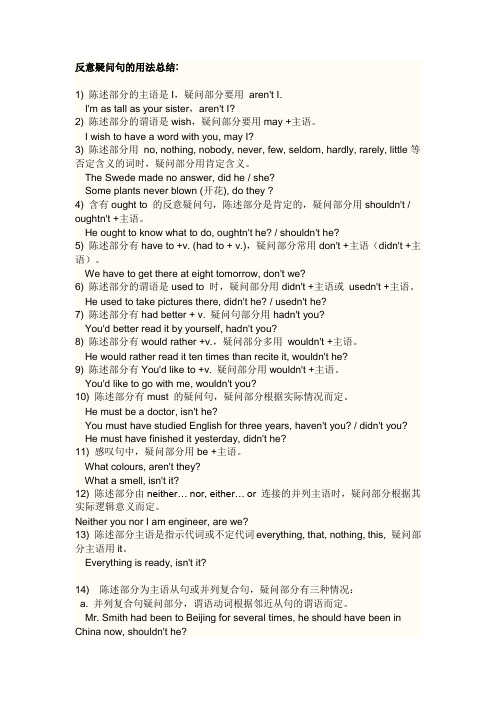
反意疑问句的用法总结:1) 陈述部分的主语是I,疑问部分要用aren't I.I'm as tall as your sister,aren't I?2) 陈述部分的谓语是wish,疑问部分要用may +主语。
I wish to have a word with you, may I?3) 陈述部分用no, nothing, nobody, never, few, seldom, hardly, rarely, little等否定含义的词时,疑问部分用肯定含义。
The Swede made no answer, did he / she?Some plants never blown (开花), do they ?4) 含有ought to 的反意疑问句,陈述部分是肯定的,疑问部分用shouldn't / oughtn't +主语。
He ought to know what to do, oughtn't he? / shouldn't he?5) 陈述部分有have to +v. (had to + v.),疑问部分常用don't +主语(didn't +主语)。
We have to get there at eight tomorrow, don't we?6) 陈述部分的谓语是used to 时,疑问部分用didn't +主语或usedn't +主语。
He used to take pictures there, didn't he? / usedn't he?7) 陈述部分有had better + v. 疑问句部分用hadn't you?You'd better read it by yourself, hadn't you?8) 陈述部分有would rather +v.,疑问部分多用wouldn't +主语。
反义疑问句用法(最新全)

反义疑问句用法(最新全)1、当陈述句的主语为anybody, anyone, everybody, everyone, somebody, someone, nobody, noone时,反意疑问句的主语用they。
但亦可用he,尤其是nobody, no one等作主语,具有否定概念时。
如:如:Somebody phone d while I was out, didn’t they?Everyone enjoyed the party, didn’t they?Nobody wants to go there, does he?Nobody says a word about the incident, don’t they?Somebody borrowed your bike yesterday, didn’t they?Anybody can do it, can’t they?2、当陈述部分的主语是I,而句子又用来征询对方的意见时,附加疑问句中的主语用you。
如:如:I find Engli sh very interesting, don’t you?I don’t li ke that film, do you?3、当陈述句的主语为everything, anything, nothing, something等时,反意疑问句的主语用it.如:Everything is all right, isn’t it?Nothing can stop us going forward, can it?4、当陈述部分的主语是指示代词this, that或these, those时,附加疑问句中的主语分别用it和they。
如:This is important, isn’t it?That isn’t correct, is it?These are your fri ends Tom and Jack, aren’t they?5、当陈述句的主语为one时, 反意疑问句的主语在正式情况下用one;在非正式情况下用you.如:One should learn from others, shouldn’t one / you?One can’t be one’s own master, can one?One can not be too careful, can one?6、当陈述句的谓语部分含有had better, would rather, would like, ought to时, 反意疑问句的谓语应用相应的助动词。
反义疑问句句型归纳

反义疑问句句型归纳1、You had no time for reading, did you \ had you?2、He has a bro ther, hasn’t he, \ doesn’t he?3、We have to go without him, don’t we ?4、You have you r dinner at school, don’t you?5、He has a res t every two hours, doesn’t he?6、This is your last chance to learn from the beginning, isn’t it?7、Those were terrible days f or us to recall, weren’t they?8、There are some books you ar e interested in, aren’t there?9、Let us do it as we please \ like to, will you \ can you?10、Let’s us do it right now, shall we \ can we?11、Come here, will you \ won’t you \ can you \ c an’t you \ do you \ don’t you?12、Don’t say anything, will you \ can you \ do you?13、Tom, you clean the window, will you?14、I think \ say \suppose \ guess \ am sure he will come back soon, won’t he?15、I don’t think he will come back , will he?16、He old man never thought he was lonely, did he?17、The old man used to be a f armer, usedn’t he \ didn’t he?18、He ought to come, oughtn’t he \ shouldn’t?19、He seldom goes to the c inema, doesn’t he?( hardly, never, few, little, nothing, nobody)20、It’s unfair, isn’t it?21、One can’t be car eful enough, can one \ can he?22、Eve rything goes well, doesn’t it?23、Everybody agrees with him, doesn’t he \ don’t they?24、All we needed has been bought, hasn’t it?25、All we invited have arrived, haven’t they(All refers to people)26、Learning E nglish is very hard, isn’t it?27、He studies hard and he is often prai sed by his teachers, isn’t he?28、We must be more polite in this occasion, needn’t we?29、He must be a brave man, isn’t he?30、It must have rained last night, didn’t it?31、He mush hav e known the answer, hasn’t he?32、He can’t have done such a foolish thing, has he?33、I am a student, aren’t I ?34、So he has known the secret, has he?35、Oh, you have the same type of sell phone as I, do you一、反意疑问句的意义及其构成反意疑问句又叫附加疑问句,是指当提问的人对前面所叙述的事实不敢肯定,而需要向对方加以证实时所提出的问句。
十八种特殊的反义疑问句
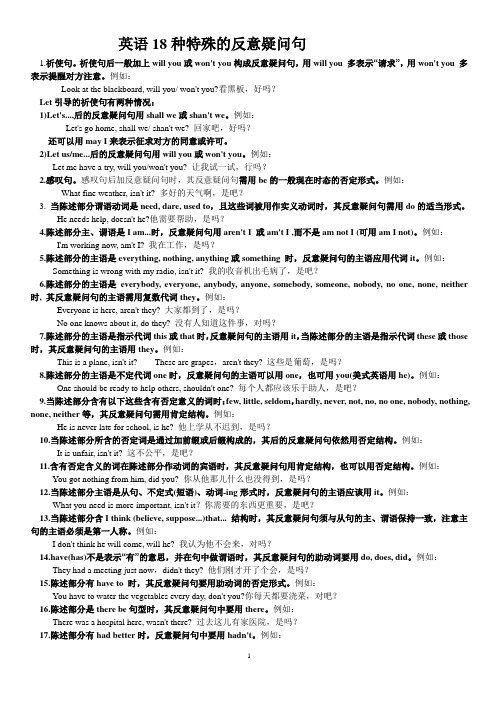
英语18种特殊的反意疑问句1.祈使句。
祈使句后一般加上will you或won't you构成反意疑问句,用will you 多表示“请求”,用won't you 多表示提醒对方注意。
例如:Look at the blackboard, will you/ won't you?看黑板,好吗?Let引导的祈使句有两种情况:1)Let's...,后的反意疑问句用shall we或shan't we。
例如:Let's go home, shall we/ shan't we? 回家吧,好吗?还可以用may I来表示征求对方的同意或许可。
2)Let us/me...后的反意疑问句用will you或won't you。
例如:Let me have a try, will you/won't you? 让我试一试,行吗?2.感叹句。
感叹句后加反意疑问句时,其反意疑问句需用be的一般现在时态的否定形式。
例如:What fine weather, isn't it? 多好的天气啊,是吧?3. 当陈述部分谓语动词是need, dare, used to,且这些词被用作实义动词时,其反意疑问句需用do的适当形式。
He needs help, doesn't he?他需要帮助,是吗?4.陈述部分主、谓语是I am...时,反意疑问句用aren't I 或am't I ,而不是am not I (可用am I not)。
例如:I'm working now, am't I? 我在工作,是吗?5.陈述部分的主语是everything, nothing, anything或something 时,反意疑问句的主语应用代词it。
例如:Something is wrong with my radio, isn't it? 我的收音机出毛病了,是吧?6.陈述部分的主语是everybody, everyone, anybody, anyone, somebody, someone, nobody, no one, none, neither 时, 其反意疑问句的主语需用复数代词they。
初中考试常见反义疑问句的用于解析及其试题类型参考

1.祈使句。
祈使句后一般加上will you或won't you构成反意疑问句,will you多表示请求,won't you多表示提醒对方。
陈述部分为否定的祈使句时,用will you。
例如:Look at the blackboard, will you/ won't you?看黑板,好吗?Let引导的祈使句有两种情况:1)Let's...,后的反意疑问句用shall we或shan't we。
例如:Let's go home, shall we/ shan't we? 回家吧,好吗?还可以用may I来表示征求对方的同意或许可。
2)Let us/me...后的反意疑问句用will you或won't you。
例如:Let me have a try, will you/won't you? 让我试一试,行吗?2.感叹句。
感叹句后加反意疑问句时,其反意疑问句需用be的一般现在时态的否定形式。
例如:What fine weather, isn't it? 多好的天气啊,是吧?3. 当陈述部分谓语动词是need, dare, used to,且这些词被用作实义动词时,其反意疑问句需用do的适当形式。
若dare和need 为情态动词,疑问部分用dare 或need构成。
例如:We need to help them, don’t we?You daren’t go there, dare you?4.陈述部分主、谓语是I am...时,反意疑问句用aren't I 或ain't I ,而不是am not I (可用am I not)。
例如:I'm working now, ain't I? 我在工作,是吗?5.陈述部分的主语是everything, nothing, anything或something 时,反意疑问句的主语应用代词it。
反义疑问句特殊句式

反意疑问句19条:1) 陈述局部的主语是I,疑问局部要用aren't I.I'm as tall as your sister,aren't I?2) 陈述局部的谓语是wish,疑问局部要用may +主语。
I wish to have a word with you, may I?3) 陈述局部用no, nothing, nobody, never, few, seldom, hardly, rarely, little等否认含义的词时,疑问局部用肯定含义。
The Swede made no answer, did he / she?Some plants never blown (开花), do they ?4) 含有ought to 的反意疑问句,陈述局部是肯定的,疑问局部用shouldn't / oughtn't +主语。
He ought to know what to do, oughtn't he? / shouldn't he?5) 陈述局部有have to +v. (had to + v.),疑问局部常用don't +主语〔didn't +主语〕。
We have to get there at eight tomorrow, don't we?6) 陈述局部的谓语是used to 时,疑问局部用didn't +主语或usedn't +主语。
He used to take pictures there, didn't he? / usedn't he?7) 陈述局部有had better + v. 疑问句局部用hadn't you?You'd better read it by yourself, hadn't you?8) 陈述局部有would rather +v.,疑问局部多用wouldn't +主语。
25种反义疑问句的特殊用法及练习2022届高考英语二轮专题
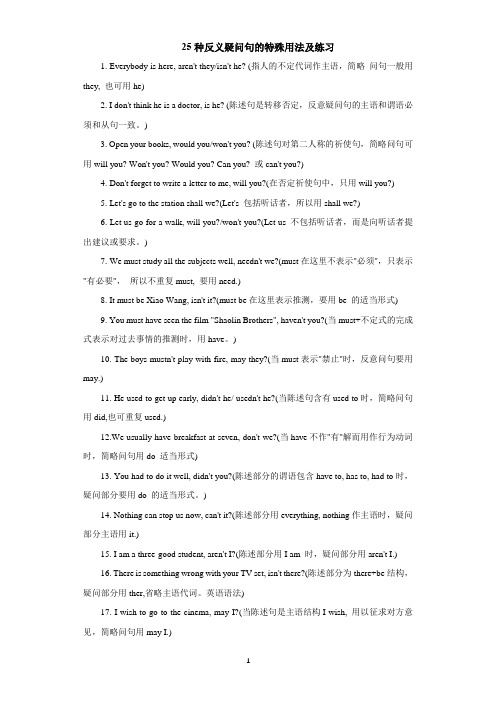
25种反义疑问句的特殊用法及练习1. Everybody is here, aren't they/isn't he? (指人的不定代词作主语,简略问句一般用they, 也可用he)2. I don't think he is a doctor, is he? (陈述句是转移否定,反意疑问句的主语和谓语必须和从句一致。
)3. Open your books, would you/won't you? (陈述句对第二人称的祈使句,简略问句可用will you? Won't you? Would you? Can you? 或can't you?)4. Don't forget to write a letter to me, will you?(在否定祈使句中,只用will you?)5. Let's go to the station shall we?(Let's 包括听话者,所以用shall we?)6. Let us go for a walk, will you?/won't you?(Let us 不包括听话者,而是向听话者提出建议或要求。
)7. We must study all the subjects well, needn't we?(must在这里不表示"必须",只表示"有必要",所以不重复must, 要用need.)8. It must be Xiao Wang, isn't it?(must be在这里表示推测,要用be 的适当形式)9. You must have seen the film "Shaolin Brothers", haven't you?(当must+不定式的完成式表示对过去事情的推测时,用have。
反义疑问句的用法总结与练习
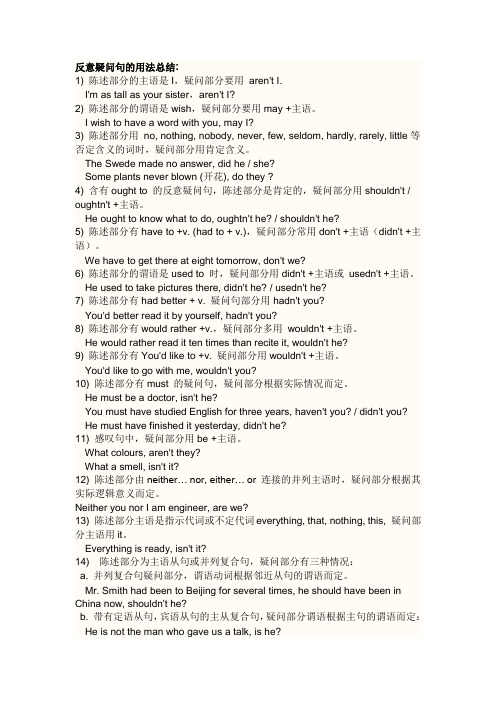
反意疑问句的用法总结:1) 陈述部分的主语是I,疑问部分要用aren't I.I'm as tall as your sister,aren't I?2) 陈述部分的谓语是wish,疑问部分要用may +主语。
I wish to have a word with you, may I?3) 陈述部分用no, nothing, nobody, never, few, seldom, hardly, rarely, little等否定含义的词时,疑问部分用肯定含义。
The Swede made no answer, did he / she?Some plants never blown (开花), do they ?4) 含有ought to 的反意疑问句,陈述部分是肯定的,疑问部分用shouldn't / oughtn't +主语。
He ought to know what to do, oughtn't he? / shouldn't he?5) 陈述部分有have to +v. (had to + v.),疑问部分常用don't +主语(didn't +主语)。
We have to get there at eight tomorrow, don't we?6) 陈述部分的谓语是used to 时,疑问部分用didn't +主语或usedn't +主语。
He used to take pictures there, didn't he? / usedn't he?7) 陈述部分有had better + v. 疑问句部分用hadn't you?You'd better read it by yourself, hadn't you?8) 陈述部分有would rather +v.,疑问部分多用wouldn't +主语。
初中英语反意疑问句的知识点
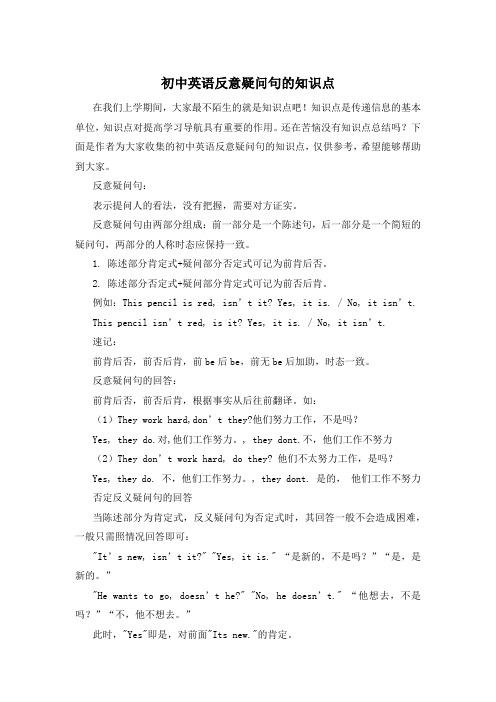
初中英语反意疑问句的知识点在我们上学期间,大家最不陌生的就是知识点吧!知识点是传递信息的基本单位,知识点对提高学习导航具有重要的作用。
还在苦恼没有知识点总结吗?下面是作者为大家收集的初中英语反意疑问句的知识点,仅供参考,希望能够帮助到大家。
反意疑问句:表示提问人的看法,没有把握,需要对方证实。
反意疑问句由两部分组成:前一部分是一个陈述句,后一部分是一个简短的疑问句,两部分的人称时态应保持一致。
1. 陈述部分肯定式+疑问部分否定式可记为前肯后否。
2. 陈述部分否定式+疑问部分肯定式可记为前否后肯。
例如:This pencil is red, isn’t it? Yes, it is. / No, it isn’t.This pencil isn’t red, is it? Yes, it is. / No, it isn’t.速记:前肯后否,前否后肯,前be后be,前无be后加助,时态一致。
反意疑问句的回答:前肯后否,前否后肯,根据事实从后往前翻译。
如:(1)They work hard,don’t they?他们努力工作,不是吗?Yes, they do.对,他们工作努力。
, they dont.不,他们工作不努力(2)They don’t work hard, do they? 他们不太努力工作,是吗?Yes, they do. 不,他们工作努力。
, they dont. 是的,他们工作不努力否定反义疑问句的回答当陈述部分为肯定式,反义疑问句为否定式时,其回答一般不会造成困难,一般只需照情况回答即可:"It’s new, isn’t it?" "Yes, it is." “是新的,不是吗?”“是,是新的。
”"He wants to go, doesn’t he?" "No, he doesn’t." “他想去,不是吗?”“不,他不想去。
(完整版)初中英语反义疑问句的用法归纳

反义疑问句It looks like rain, doesn’t it?He doesn’t need to work so late, does he?This is a dictionary, isn’t it?Those are shelves, aren’t they?There once was a man named Saint Nicholas, wasn’t there?I am very interested in learning English, aren’t I?4)陈述句的主语是动词不定式,动词的-ing形式或从句时,疑问部分的主语多用it来体现。
如:Taking care of our environment is very important, isn’t it?What he said is right, isn’t it?5)陈述句中含有not, no, hardly, neither, never, few, little, too …to等否定词或具有否定意义的词时,疑问部分常用肯定形式。
如:Few people knew the news, did they?Tom has never been to England , has he?She is unhappy, isn’t she?No one knows him, do they?Someone is waiting for you, isn’t he?Nobody says a word about the accident, do they?Everything seems all right, doesn’t it?7)陈述句是主从复合句时,如果主句的谓语动词是think, believe, expect, feel, guess等词,且主语是第一人称I或we时,反意疑问部分的人称、时态与宾语从句保持一致,同时还要考虑到否定的转移(否定前移)。
反义疑问句讲解及答案
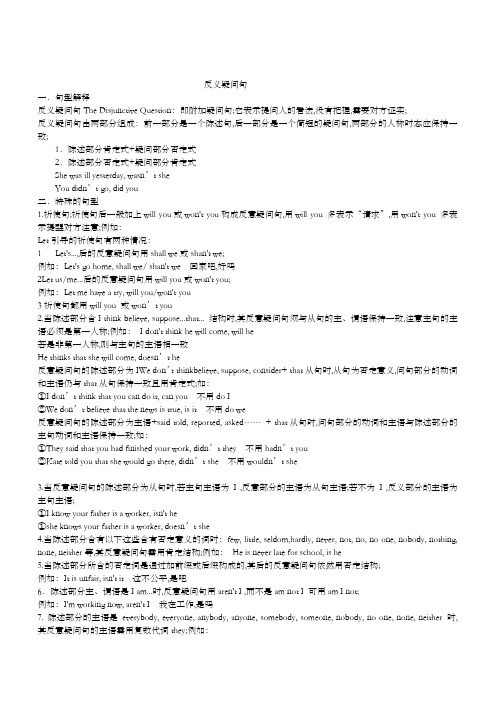
反义疑问句一.句型解释反义疑问句The Disjunctive Question:即附加疑问句;它表示提问人的看法,没有把握,需要对方证实;反义疑问句由两部分组成:前一部分是一个陈述句,后一部分是一个简短的疑问句,两部分的人称时态应保持一致;1.陈述部分肯定式+疑问部分否定式2.陈述部分否定式+疑问部分肯定式She was ill yesterday, wasn’t sheYou didn’t go, did you二.特殊的句型1.祈使句;祈使句后一般加上will you或won't you构成反意疑问句,用will you 多表示“请求”,用won't you 多表示提醒对方注意;例如:Let引导的祈使句有两种情况:1 Let's...,后的反意疑问句用shall we或shan't we;例如:Let's go home, shall we/ shan't we 回家吧,好吗2Let us/me...后的反意疑问句用will you或won't you;例如:Let me have a try, will you/won't you3祈使句都用will you 或won’t you2.当陈述部分含I think believe, suppose...that... 结构时,其反意疑问句须与从句的主、谓语保持一致,注意主句的主语必须是第一人称;例如:I don't think he will come, will he若是非第一人称,则与主句的主语相一致He thinks that she will come, doesn’t he反意疑问句的陈述部分为IWe don’t thinkbelieve, suppose, consider+ that从句时,从句为否定意义,问句部分的动词和主语仍与that从句保持一致且用肯定式;如:①I don’t think that you can do it, can you 不用do I②We don’t believe that the news is true, is it 不用do we反意疑问句的陈述部分为主语+said told, reported, asked……+ that从句时,问句部分的动词和主语与陈述部分的主句动词和主语保持一致;如:①They said that you had finished your work, didn’t they 不用hadn’t you②Kate told you that she would go there, didn’t she 不用wouldn’t she3.当反意疑问句的陈述部分为从句时,若主句主语为I ,反意部分的主语为从句主语;若不为I ,反义部分的主语为主句主语;①I know your father is a worker, isn't he①she knows your father is a worker, doesn’t she4.当陈述部分含有以下这些含有否定意义的词时:few, little, seldom,hardly, never, not, no, no one, nobody, nothing, none, neither等,其反意疑问句需用肯定结构;例如:He is never late for school, is he5.当陈述部分所含的否定词是通过加前缀或后缀构成的,其后的反意疑问句依然用否定结构;例如:It is unfair, isn't it 这不公平,是吧6.陈述部分主、谓语是I am...时,反意疑问句用aren't I ,而不是am not I 可用am I not;例如:I'm working now, aren't I 我在工作,是吗7. 陈述部分的主语是everybody, everyone, anybody, anyone, somebody, someone, nobody, no one, none, neither 时, 其反意疑问句的主语需用复数代词they;例如:Everyone is here, aren't they 大家都到了,是吗No one knows about it, do they 没有人知道这件事,对吗8.陈述部分的主语是everything, nothing, anything或something 时,反意疑问句的主语应用代词it;例如:Something is wrong with my radio, isn't it我的收音机出毛病了,是吧9.陈述部分的主语是指示代词this或that时,反意疑问句的主语用it,当陈述部分的主语是指示代词these或those 时,其反意疑问句的主语用they;例如:This is a plane, isn't it 这是一架飞机,是吗These are grapes,aren't they 这些是葡萄,是吗10.陈述部分的主语是不定代词one时,反意疑问句的主语可以用one,也可用you;例如:One should be ready to help others, shouldn't one每个人都应该乐于助人,是吧11. 当陈述部分谓语动词是need, dare,且这些词被用作实义动词时,其反意疑问句需用do的适当形式;例如:He needs help, doesn't he 他需要帮助,是吗12.当陈述部分主语是从句、不定式短语、动词-ing形式时,反意疑问句的主语应该用it;例如:What you need is more important, isn't it你需要的东西更重要,是吧12.havehas不是表示“有”的意思,并在句中做谓语时,其反意疑问句的助动词要用do, does, did;例如:They had a meeting just now,didn't they他们刚才开了个会,是吗15.陈述部分有have to 时,其反意疑问句要用助动词的否定形式;例如:You have to water the vegetables every day, don't youYou had to water the vegetables every day, didn't you16.He used to stay up late, usedn’t he/ didn’t he17.陈述部分是there be句型时,其反意疑问句中要用there;There was a hospital here, wasn't there18.陈述部分有had better时,反意疑问句中要用hadn't;例如:We’d better go to school at once, hadn't weHe’d rather go home, wouldn’t he19.当陈述部分含有情态动词must时,我们便要分析一下must的含义;如果must 作“一定;要;必须”讲,反意疑问句须用mustn't或needn't;而当must作推测意义“一定是;必定”讲时,反意疑问句则需根据must后的动词原形选用相应的形式;例如:He must work hard at physics, mustn't he他必须努力学物理,是吧Tom must be at home,isn't he 汤姆一定在家,是吧①He might have forgotten his pen in the classroom yesterday, didn’t he不用mightn’t he / hasn’t he②You must have got up late this morning, didn’t you 不用mustn’t you /haven’t you20.反意疑问句的回答用yes, no, 但是,回答意思相反,当陈述部分是否定形式时,回答要按事实;例如:They don’t work hard, do theyYes, they do. 不,他们工作努力;/No, they don’t. 对, 他们工作不努力;反意疑问句的陈述部分为I am……时,问句部分习惯上用aren’t I 表示;如:I am a very honest man, aren’t I反意疑问句练习1. I suppose the shoes will last you at least one year, ____________A. won’t theyB. will theyC. do ID. don’t2. Everyone is surprised at the news, _____________A, is he B. are they C. aren’t they D. is not he3. ----- You will come to have dinner with us, won’t you----- ____________A. Excuse me, I won’t.B. I haven’t been there.C. You are welcome.D. Yes. That’s very nice of you.4. Tom isn’t a hard-working student, for it is the third time he has been late, ______________A. wasn’t itB. hasn’t itC. isn’t itD. hasn’t he5. You don’t have to go school on Sundays, _____________ youA. haveB. doC. shouldD. would6. I don’t think he had his supper at the school, _____________A. had heB. did heC. do ID. don’t you7.I don’t think he’d like to take such a difficult job, __________A. had heB. would heC. do ID. don’t you8. I don’t think her passport’s gone, __________A. is itB. has sheC. do ID. don’t you9. Do pay attention to my work and keep your eyes open all the time, ____________A. will youB. don’t youC. shall weD. won’t we10. All the drivers dislike driving on the narrow roads ________________A. don’t theyB. don’t each of themC. do ID. don’t you11. Let’s go and have a walk,___________A. doB. shallC. haven’tD. shan’t12. Go and fetch a chair for him, ___________A. don’t youB. shall youC. won’t youD. will you13. There used to be a shop behind the factory, ________________A. didn’t thereB. used thereC. usedn’t it C. didn’t it14. I’m sure he must have been sleeping at the moment, __________A. aren’t I B, mustn’t C. wasn’t he D. hasn’t15. I had to tell the truth, __________A. hadn’t IB. wouldn’t IC. didn’t ID. shouldn’t I16.------- Why is Tom absent now-------He must be sick,________________A. isn’t heB. must heC. is heD. mustn’t he17, He’d like to have a look at your picture,_________-heA. hadn’tB. didn’t C .couldn’t D .wouldn’t18. You don’t think he will come,_________A. do youB. will youC. will heD. won’t he19. Let’s go home, shall we _________.A. That’s right.B. That’s allC. That’s all rightD. All right20. Jack had dinner with his mother at home yesterday,A. didB. doesC. didn’tD. hadn’t21. Let John finish the work all by himself,___________A. shall weB. will youC. do youD. do we22.I don’t think it is going to rain, _____________ itA. do IB. do youC. isD. isn’t23. Nothing the boy did was right, _______ itA. wasB. didC. wasn’t C. didn’t24. It’s the first time that she has been to the United States, ____________A. isn’t sheB. isn’t itC. hasn’t sheD. hasn’t it25. He was hardly able to stand on his feet after the car accident,__________ heA. couldB. couldn’tC. wasD. wasn’t26. Jack seldom goes to the park, _______________A. does heB. doesn’t heC. does JackD. doesn’t Jack27. People use tag question 反意疑问because they are not sure of what they have said _____________theyA. doB. didC. didn’tD. don’t28. Everyone wants to be chosen for the work, ____________A. isn’t heB. does heC. don’t theyD. do they29. She is going to see you ,_________ sheA. isn’tB. isC. don’tD. doesn’t30. They used to live in these mountain areas ,_____________ theyA. didB. didn’tC. usedD. weren’t31. He ought to go by plane, _____heA. shouldn’tB. wouldn’tC. shouldD. would32. Lovely weather ___________A. Yes. You are right.B. Yes ,isn’t itC. No, it isD. No, you are wrong33. ---------- You must do as I tell you.----------Oh, I must, ____________IA. shouldB. mustn’tC. oughtD. must34. We must start earlier,__________ weA. needn’tB. mustn’tC. don’tD. mustn’t35. You must have studied English for many years, _________ youA. didn’tB. haven’tC. needn’tD. mustn’t36. She must have arrived there yesterday, __________ sheA. didn’tB. hasn’tC. needn’tD. mustn’t37. We mustn’t be late, __________ weA. mustB. mayC. areD. A&B38, I needn’t show her the keys to the question, ________ IA. mustB. needC. canD. do39. We need to practice speaking English more often, ___________ weA. mustn’tB. needn’tC. can’tD. don’t40. I have to work this afternoon,__________ I A. don’t C, haven’t D. doKEY. 1--10 ACDCB BBAAA 11-20 BDACC ADADC21-30 BCABC ADCAB 31-40 ABDAB ADBDC。
高中英语反意疑问句用法归纳

反意疑问句用法归纳在反义疑问句中,简略问句的主语和谓语在人称和数方面要和前面的陈述句保持一致,但是,也有不少不一样的特殊情况,大致有25 种情况。
1. Everybody is here, aren't they/isn't he (指人的不定代词作主语,简略问句一般用they, 也可用he)2. I don't think he is a doctor, is he (陈述句是转移否定,反意疑问句的主语和谓语必须和从句一致。
)3. Open your books, would you/won't you (陈述句对第二人称的祈使句,简略问句可用will you Won't you Would you Can you 或can't you)4. Don't forget to write a letter to me, will you(在否定祈使句中,只用will you)5. Let's go to the station shall we(Let's 包括听话者,所以用shall we)6. Let us go for a walk, will you/won't you(Let us 不包括听话者,而是向听话者提出建议或要求。
)7. We must study all the subjects well, needn't we(must 在这里不表示"必须",只表示"有必要",所以不重复must, 要用need.)8. It must be Xiao Wang, isn't it(must be在这里表示推测,要用be 的适当形式)9. You must have seen the film "Shaolin Brothers", haven't you(当must+不定式的完成式表示对过去事情的推测时,用have。
反义疑问句用法(最新全)
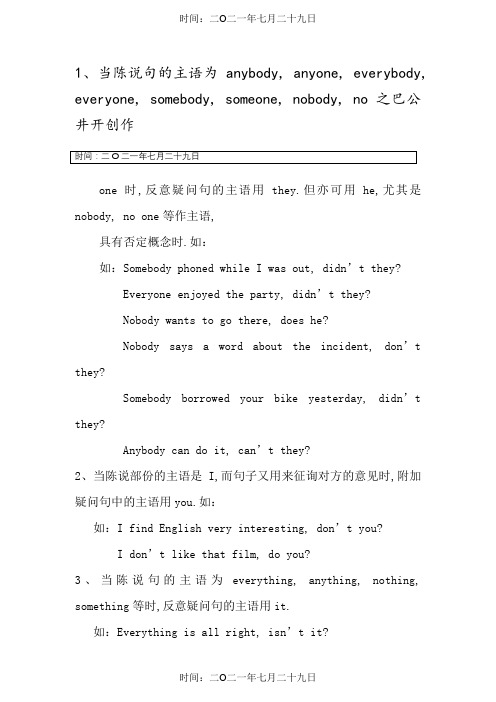
1、当陈说句的主语为anybody, anyone, everybody, everyone, somebody, someone, nobody, no 之巴公井开创作one时,反意疑问句的主语用they.但亦可用he,尤其是nobody, no one等作主语,具有否定概念时.如:如:Somebody phoned while I was out, didn’t they?Everyone enjoyed the party, didn’t they?Nobody wants to go there, does he?Nobody says a word about the incident, don’t they?Somebody borrowed your bike yesterday, didn’t they?Anybody can do it, can’t they?2、当陈说部份的主语是I,而句子又用来征询对方的意见时,附加疑问句中的主语用you.如:如:I find English very interesting, don’t you?I don’t like that film, do you?3、当陈说句的主语为everything, anything, nothing, something等时,反意疑问句的主语用it.如:Everything is all right, isn’t it?Nothing can stop us going forward, can it?4、当陈说部份的主语是指示代词this, that或these, those时,附加疑问句中的主语分别用it和they.如:This is impo rtant, isn’t it?That isn’t correct, is it?These are your friends Tom and Jack, aren’t they?5、当陈说句的主语为one时, 反意疑问句的主语在正式情况下用one;在非正式情况下用you.如:One should learn from others, shouldn’t one / you?One can’t be one’s own master, can one?One can not be too careful, can one?6、当陈说句的谓语部份含有had better, would rather, would like, ought to时, 反意疑问句的谓语应用相应的助动词.如:You’d better go now, hadn’t you?You’d rather go there early, wouldn’t you?He’d like to go there, wouldn’t he?She ought to go there by train, shouldn’t / oughtn’t she?Such things ought not to be allowed, ought they?He ought to be punished, oughtn’t he?7、当陈说句的谓语是wish时, 反意疑问句的谓语用may, 而且前后两个部份都用肯定式.E.g.如:I wish to go home now, may I?I wish to have another piece of cake, may I?8、当陈说句的谓语部份含有have to, had to时, 反意疑问句的谓语部份用do的适当形式.如:We have to get there at 8 o’clock tomorrow, don’t we?They had to take the early train to go there, didn’t they?9、当陈说句的谓语部份含有used to时, 反意疑问句的谓语部份有两种表达方式didn’t / usedn’t.如:He used to get up early, didn’t / usedn’t he?The old man used to smoke, didn’t he?或usedn’t he?Tom used to live here, usedn’t he?或didn’t he? 10、感叹句后的附加疑问句的谓语动词需用be的现在时,且经常使用否定形式.如:如:What a clever boy, isn’t he?What a lovely day, isn’t it?11、当陈说句的主语是第一人称,谓语动词是 think, believe, suppose, fancy, imagine, expect,后接宾语从句时, 反意疑问句应对宾语从句进行提问.如:I don’t think he can finish the work, can he?I don’t expect that she would come, would she?I imagine that the students like her, don’t they?I don’t believe she knows it, does she?12、当陈说句的主语是第二,第三人称,谓语动词是think, believe, suppose, fancy, imagine, expect后接宾语从句时, 反意疑问句应对主句进行提问.如:Mary thinks you will come to the meeting, doesn’t she?You don’t think English is important, do you?You think she is a good teacher, don’t you?Your brother thinks that you can do the job well, doesn’t he?13、陈说部份带有seldom, hardly, never, rarely, few, little,nowhere, nothing, nobody,scarcely等否定词或半否定词时,附加疑问部份的动词用肯定形式.如:如:Bob rarely got drunk, did he?Few people know him, do they?She seldom goes to the cinema, does she?He has few good reasons for staying, has he?She hardly writes to you, does she?There is little water in the bottle, is there?如果陈说部份的否定词带有否定前缀,那么,该陈说部份作肯定处置,附加疑问部份一般仍用否定形式.如:如:He was unsuccessful, wasn’t he?Tom dislikes the book, doesn’t he?14、祈使句的各种反意疑问句:1). Let’s …, shall we? E.g. Let’s go to the film, shall we?2). Let us … , will you? E.g. Let us go to the park, will you?3). Let me … , may I / will you ?E.g. Let me go there alone, may I? / will you?If you want helpmoney or anything, let me know, will you?4). 在否定的祈使句的后面,只能用will you? E.g. Don’t tell anyone, will you?5). 暗示“请求” 意思的祈使句,反意疑问句用will you?E.g. Pass me the dictionary, will you?Stop that noise, will you?6). 暗示“邀请”, “劝诱” 意思的祈使句,反意疑问句用won’t you?E.g. Join us in the singing, won’t you?15、陈说句中谓语动词是must + have + 动词的过去分词时,如果强调对过去情况的推测, 依据是(句中有过去的时间状语),反意疑问句根据动词用didn’t / wasn’t / weren’t +主语.如:You must have read the story last term, didn’t you?He must have met her yesterday, didn’t he?16、陈说句中谓语动词是must + have + 动词的过去分词时,如果只强调举措的完成,反意疑问句用haven’t/ hasn’t +主语.如:She must have arrived there, hasn’t she?You must have seen the film, haven’t you?17、陈说句中谓语动词是must + 动词原形的情况:You must see the doctor, needn’t you? (must在这里不暗示”必需”,只暗示”有需要”,所以不重复must, 要用need)如:You mustn’t do that again, must you?The food must be nice, isn’t it? (must be在这里暗示推测,要用be 的适当形式)The boys mustn’t play with fire, may they? (当must暗示”禁止”时,反意问句要用may.)18、当陈说句的主语为each时, 反意疑问句的主语用he.如:Each has his strong points, hasn’t he? / doesn’t he?19、当陈说句的主语为each of us, each of you, each of them时, 反意疑问句的主语用we, you,they.如:Each of us has been here, haven’t we?Each of them has an English dictionary, haven’t they?20、当陈说句的主语为each of … 结构时,反意疑问句的主语用he ,she, it 强调个体, 用we, you,they 强调全体.如:Each of these novels is to be discussed this term, isn’t it?Each of us have got the prize, haven’t we?21、当陈说部份是并列句,附加疑问句则需和就近的分句的主语和谓语一致.如:如:It must have rained last night, for the ground is wet, isn’t it?Tom has been writing letters all afternoon, but he has finished now, hasn’t he?We must start a t once or we can’t get there on time, can we?He is a teacher but his wife isn’t a teacher, is she?Xiao Lin has been writing letters all afternoon but he should finish them now, shouldn’t he?22、当陈说部份为主从复合句时,附加疑问部份一般应与主句的主语和谓语动词坚持对应关系.如:如:She says that I did it, doesn’t she?I told them not everybody could do it,didn’t I?She is not so stupid as she looks, is she?Lucy dreamed that she was in the moon, didn’t she?但当陈说部份的主语是I,谓语是think, believe, suppose, expect这类动词时,附加疑问部份则往往与从句中的主语和谓语动词坚持对应关系,但要注意否定的转移.I suppose that he’s serious isn’t he?I don’t think she cares, does she?23、陈说句主语为such时,反意疑问句的主语双数用it,复数用they.如:Such is his trick, isn’t it?Such are your excuses, aren’t they?24、当陈说句是I am … 结构时,反意疑问句用aren’t I.如:I am right, aren’t I?I am late, aren’t I?25、如果陈说句中的否定式仅仅是带有否定的词缀,反意疑问句仍用否定.如:He is unfit for his job, isn’t he?That’s unfair, isn’t it?26、当陈说句部份是there used to be … 结构时, 反意疑问句用wasn’t (weren’t) there.如:There used to be three pine trees in the yard, weren’t there?There used to be shop at the corner of the street, wasn’t there?27、陈说句中谓语动词是may / might 时,反意疑问句用mayn’t / mightn’t构成.如:I may come and borrow your bike tomorrow, mayn’t I?The experience may have been long in your memory, mayn’t it?28、陈说句子中的主语为动词不定式短语、动名词短语或其他短语时,疑问部份的主语通经常使用it.如:Learning how to repair motors takes a long time,doesn’t it?Between six and seven will suit you, won’t it?Where to hold the meeting has not been decided, has it?That China is a great socialist country is well known, isn’t it?29、陈说部份为there+be结构,疑问部份用there,省略主语代词.如:There is something wrong with your TV set, isn’t there?30、陈说部份的谓语含有dare, need时,看它们是情态动词还是行为动词,分别重复dare, need或用do 的适当形式.如:The girl daren’t go home alone, dare she?31、在"none of…"结构中,如of 后的名词或代词是双数,后面的主语也为双数,这种情况,主要由于of 后的名词或代词为不成数名词.如:None of it is here, is it?32、在口语和非正式文体中,为了加强语气,只是暗示某种惊奇、怀疑、反感、讽刺等感情而并不是为了寻求回答,这时前后两部份的肯定、否定是一致的.如:Oh, he is a writer, is he?You’ll not go, won’t you?33、当陈说部份带有暗示“所有”含义的动词have(has)时,疑问部份既可用have形式,也可用do形式.如:You have a new bike, haven’t you(或don’t you)?She doesn’t have any money in her pocket, does she?反义疑问句练习一、完成下列句子1、Few of them hurt themselves in the accident last night, ___________ ?2、You’ve never seen dinosaur eggs, have you ?_______________. How I wish to visit the Dinosaur World.3、His sister had a bad cough, _________she?4、Mr. Green went to Shenzhen on business last week, ________?5、John can hardly understand any Chinese, _________he?6、Don’t smoke in the meetingroom, _________?7、Lucy, you clean the blackboard today, _______?8、Miss Cheng will never forget her first visit to Canada ,________?9、The lady couldn’t say a word when she saw thesnake,__________?10、__________the population of china? 1,300,000,000.11、______I go and meet you at the airport?No ,thanks, dear . I can take a taxi home.12、________is the Confucian Temple(孔庙) from here?It’s about 10 minutes’ walk.13、_________may I keep these books?two weeks.14、Tina is unhappy now, ____________?15、You won’t follow his example, will you ?________________, I don’t think he i s right.16、__________do you go to Hong Kong?sorry , I’ve never been there.17、The boy has to stay at home to look after his little sister,_________?Yes, because his mother has gone shopping.18、You lent me some money a few months ago._________? I don’t remember lending you any money.19、My uncle has never been to a foreign country,_____________?20、There is some water in that bottle, ___________?21、_____________will the foreign students be backfrom NanJing?In two days, I think.22、Let’s go and play f ootball,__________?That’s wonderful.23、I don’t think that the necklace is made of diamond, __________?24、His wife had the carpets and the curtains cleaned, ____________?25、It’s my son’s wedding next week, and I have to do my best for that,__________?26、Harry wouldn’t become a teacher if it hadn’t been for the holiday, __________?27、No one left here yesterday,_____________?28、Birds rarely build nests in our garden,_____________?29、You must have been to the Great Wall, ____________?30、Learning how to repair motors takes a long time, _____________?31、They must have stayed at home last night,____________?32.、There’s not much news in today’s newspaper, _____________?33、They need our help badly at the moment, ______________?34、She is unfit for the position, _____________?35、I wish to visit America, _____________?36、She’s been a worker here for many years, ______________?37、What beautiful flowers, ______________?38、Mother used to live in a poor village, ____________?39、You’d better go at once, _____________?40、I am very interested in Mark Twain’s novels, ____________?41、He never gets up late, _____________?42、Don’t go out, ______________?43、Everything begins to grow in spring, ______________?44、He can hardly finish the work, _____________?45、Let us go home, ____________?46、You think he is a good student, ____________?47、Nobody knows where she lives, ______________?48、Few students can answer the question, ________________?49、You needn’t attend the meeting, ______________?50、We need to come on Sunday, _____________?二、选择填空1. You’d rather watch TV this evening, ______?a. isn’t itb. hadn’t youc. wouldn’t youd. won’t you2. I suppose you’re not going today, ______?a. are youb. do youc. don’t youd. aren’t you3. I wish to shake hands with you, ______?a. shallb. may Ic. do Id. will I4. Three hours ought to be enough time, ______?a. oughtn’t three hoursb. didn’t theyc. shouldn’t itd. shouldn’t three hours5. They have to study a lot, ______?a. don’t theyb. haven’t theyc. did theyd. hadn’t they6. When the car crashed, your brother escaped being hurt, ______ ?a. didn’t heb. did hec. did itd. didn’t it7. I'm sure dirty, ______?a. am Ib. isn’t Ic. aren’t Id. am not I8. You seem to be dissatisfied with your present post.I don’t think you judged your abilityobjectively when you applied for it, ______ you?a. dob. didc. don’td. didn’t9. That’s the sort of the book you want, ______?a. is itb. isn’t thatc. is thatd. isn’t it10. All these dictionaries are a great help to you, ______?a. are theyb. aren’t theyc. are all these dictionariesd. aren’t all these dictionaries11. The movie that we saw last week was quite interesting, ______?a. wasn’t itb. was itc. didn’t wed. weren’t we12. Tom has been writing letters all afternoon, but he should have finished them by now,______?a. hasn’t heb. has hec. shouldn’t hed. didn’t you13. David told me that you would take a trip to America, ______?a. would youb. wouldn’t youc. did youd. didn’t you14. There appeared to be no better way, _______?a. was thereb. were therec. did thered. didn’t there15. You has some trouble finding where I live, ______?a. didn’t youb. hadn’t youc. do Id. don’t I16. He has his hair cut every month, ______?a. has h eb. hasn’t hec. does hed. doesn’t he17. Your friend needs to come earlier, ______?a. does heb. doesn’t hec. need hed. needn’t he18. The little boy dare not go to church, ______?a. dare heb. daren’t hec. does hed. doesn’t he19. Susan’d have worked abroad if she’d had the chance, ______?a. has sheb. hadn’t shec. would shed. wouldn’t she20. Everyone’s having a good time, ______?a. is heb. isn’t everyonec. does hed. aren’t they21. Any one can join the club, ______?a. can any oneb. can’t any onec. can’t theyd. can they22. Tell me how to operate the electronic computer, ______?a. will youb. shan’t youc. do youd. don’t you23. Magaret scarcely comes to visit you on Christmas Day, ______?a. doesn’t sheb. does shec. do youd. don’t you24. Let’s listen to the radio program that the teacher mentioned, ______?a. do web. don’t wec. shall wed. shan’t we25. You think you’re funny, ______?a. didn’t youb. are youc. don’t youd. do you26. Janet used to take part in labor in that village, ______?a. used sheb. did shec. didn’t shed. should she27. What beautiful weather, ______?a. is itb. isn’t itc. won’t itd. doesn’t it28. He ought to go to Kwangchow by plane, ______?a. should heb. shouldn’t hec. would hed. wouldn’t he29. We never dared to ask him a question, ______?a. did web. didn’t wec. dared wed. daren’t we30. Nobody will believe how difficult his work has been ______?a. will heb. won’t nobodyc. will theyd. won’tthey31. You must have made the mistake, ______?a. must n’t youb. haven’t youc. didn’t youd. hadn’t you32. Learning how to repair computers takes a long time, ______?a. isn’t itb. aren’t theyc. doesn’t itd. don’t they33. Jack has coffee with breakfast, ______?a. hasn’t Jackb. hasn’t hec. doesn’t Jackd. doesn’t he34. They must have stayed at hotel last night, ______?a. mustn’t theyb. haven’t theyc. didn’t theyd. hadn’t they35. There isn’t anything wrong with the radio, ______?a. is thereb. is itc. does itd. does there36. You must be hungry, ______?a. must youb. mustn’t youc. are youd. aren’t you37. Let’s do the exercises by ourselves, ______?a. shall web. shan’t wec. will youd. will we38. Her daughter had the carpets and curtains cleaned, ______?a. had sheb. hadn’t shec. didn’t shed. didn’t her daughter39. The teacher had a talk with you, ______?a. has youb. hadn’t shec. did shed. didn’t she40. Something’ll have to be done about the air pollution, ______?a. won’t itb. will itc. has itd. does it谜底:一、完成下列句子1、did they2、No, I ha ven’t3、didn’t4、didn’t he5、can6、will you7、will you8、will she9、could she10、What’s11、Shall 12、How far13、How long14、isn’t she15、No, Iwon’t16、How often17、doesn’t he18、Did I19、has he20、isn’t there21、How soon22、shall we23、is it24、didn’t she25、don’t I26、would he27、did they28、do they29、haven’tyou30、doesn’t it31、didn’tthey32、is there33、don’t they34、isn’t she35、may I36、hasn’t she37、aren’t they38、usedn’ tshe/didn’t she39、hadn’t you40、aren’t I41、does he42、will you43、doesn’t i t44、can he45、will you46、don’t you47、do they/does he48、can they49、need you50、don’t we二、选择填空时间:二O二一年七月二十九日时间:二O二一年七月二十九日。
完整版)反义疑问句归纳整理
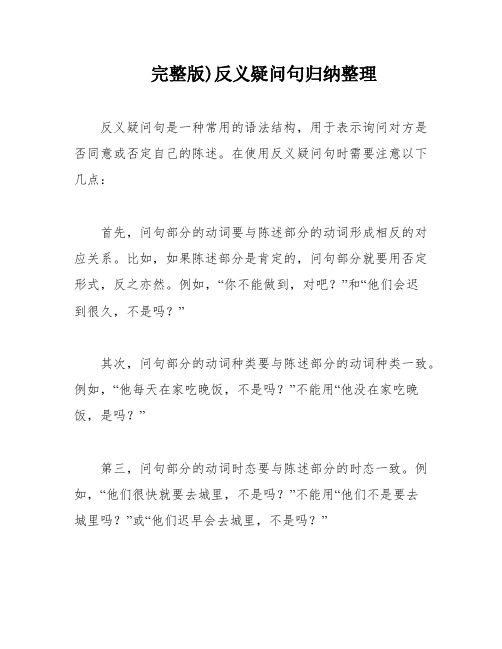
完整版)反义疑问句归纳整理反义疑问句是一种常用的语法结构,用于表示询问对方是否同意或否定自己的陈述。
在使用反义疑问句时需要注意以下几点:首先,问句部分的动词要与陈述部分的动词形成相反的对应关系。
比如,如果陈述部分是肯定的,问句部分就要用否定形式,反之亦然。
例如,“你不能做到,对吧?”和“他们会迟到很久,不是吗?”其次,问句部分的动词种类要与陈述部分的动词种类一致。
例如,“他每天在家吃晚饭,不是吗?”不能用“他没在家吃晚饭,是吗?”第三,问句部分的动词时态要与陈述部分的时态一致。
例如,“他们很快就要去城里,不是吗?”不能用“他们不是要去城里吗?”或“他们迟早会去城里,不是吗?”第四,如果陈述部分含有否定前缀,问句部分要用肯定形式。
例如,“你父亲不开心,是吧?”不能用“他开心吧?”第五,如果陈述部分含有否定意义的词语,问句部分要用肯定式。
例如,“她从不说谎,是吗?”不能用“她不说谎吧?”最后,如果陈述部分是“I am…”,问句部分通常用“aren’t I?”表示。
例如,“我是一个很诚实的人,不是吗?”②I don't have anything to say。
do I?七、当陈述部分为I(We)认为(think)、相信(believe)、假设(suppose)、考虑(consider)+that从句时,问句部分的动词和主语应与that从句内的动词和主语保持一致。
例如:①他已经尽力了,对吧?我认为他已经尽力了,对吧?②我们认为英语很有用,不是吗?(不用don’t we?)八、当陈述部分为I(We)不认为(don't think)、不相信(don't believe)、不假设(don't suppose)、不考虑(don't consider)+that从句时,从句为否定意义,问句部分的动词和主语仍应与that从句保持一致,但使用肯定式。
例如:①我不认为你能做到,对吧?(不用do I?)②我们不相信这个消息是真的,不是吗?(不用do we?)九、当陈述部分为非第一人称主语+ think(believe。
反意疑问句特殊情况30例

反意疑问句特殊情况30例反义疑问句的形式:反意疑问句是附加在陈述句之后, 对所陈述内容提出质疑或通过反问以强化陈述内容的一种疑问句。
总体原则:如果陈述部分是肯定的, 附加部分用否定形式;如果陈述部分是否定的, 附加部分用肯定形式。
附加部分的助动词和代词应与陈述部分一致。
例如:They are students , aren't they ?They aren't students , are they ?特殊情况小结:1. 在由“祈使句+ 疑问部分” 构成的反意疑问句中,疑问部分通常用will youPass me the dictionary , will you ? 把词典递给我好吗?Don’t do that again , will you ? 别再做那件事好吗?应特别注意带有主语的祈使句。
例如:——Alice , you feed the bird today , will you ?——But I fed it yesterday.)时用2. 在含有let的祈使句后的反意疑问部分,如果let的宾语us包括听者(常写成let’sshall we ;不包括听者(常写成let us)时用will you 。
Let的宾语是me时, 要根据意思用will you或may I 。
let的宾语是第三人称时用will you。
例如:Let’s go for a walk , shall we ? 我们去散步好吗?Let us do it by ourselves , will you ? 让我们自己做这件事好吗?Let me have a look at your photo , will you ? (你)让我看看你的照片好吗?Let him speak first , will you ? (你)让他先说好吗?3. 当陈述部分含有must 时, 要注意must 的含义。
表示"一定要, 必须"时, 反意疑问句附加部分用mustn't 或needn't。
初中英语反义疑问句的用法归纳

反义疑问句It looks like rain, doesn’t it?He doesn’t need to work solate, does he?Thisis a dictionary, isn’t it?Thoseare shelves, aren’tthey?There once was a man namedSaintNicholas,wasn’tthere?I amvery interested in learning English, aren’t I?4)陈述句的主语是动词不定式,动词的-ing形式或从句时,疑问部分的主语多用it来体现。
如: Taking care of our environmentisvery important, isn’t it?What he said is right, isn’t it?5)陈述句中含有not, no, hardly, neither,never,few, little, too …to等否定词或具有否定意义的词时,疑问部分常用肯定形式。
如:Fewpeopleknew thenews,didthey?Tom has never been to England,has he?She isunhappy,isn’tshe?No one knows him, do they?Someone is waitingfor you,isn’the?Nobody saysaword abouttheaccident,dothey?Everything seemsall right,doesn’t it?7)陈述句是主从复合句时,如果主句的谓语动词是think, believe,expect,feel,guess等词,且主语是第一人称I或we时,反意疑问部分的人称、时态与宾语从句保持一致,同时还要考虑到否定的转移(否定前移)。
如:Ibelievethat theboy can get aticketfor you, can’the?Idon'tthink he is bright, ishe?We believe she can do itbetter, can't she?若是第二第三人称的话,反义疑问句应该看主句:Shethought it is meaningless,didn't she?如果是转述的要注意:Hesaidthat youwerein hospital,weren't you?(这里是对着那个you说的)8)祈使句的反义疑问句中:let's 的要用shall we;let us 的要用will you;其他形式的都用will you。
- 1、下载文档前请自行甄别文档内容的完整性,平台不提供额外的编辑、内容补充、找答案等附加服务。
- 2、"仅部分预览"的文档,不可在线预览部分如存在完整性等问题,可反馈申请退款(可完整预览的文档不适用该条件!)。
- 3、如文档侵犯您的权益,请联系客服反馈,我们会尽快为您处理(人工客服工作时间:9:00-18:30)。
初中英语18种特殊的反意疑问句
1.祈使句。
祈使句后一般加上will you或won't you构成反意疑问句,用will you 多
表示“请求”,用won't you 多表示提醒对方注意。
例如:Look at the blackboard, will you/ won't you?看黑板,好吗?
Let引导的祈使句有两种情况:
1)Let's...,后的反意疑问句用shall we或shan't we。
例如:
Let's go home, shall we/ shan't we? 回家吧,好吗?
还可以用may I来表示征求对方的同意或许可。
2)Let us/me...后的反意疑问句用will you或won't you。
例如:
Let me have a try, will you/won't you? 让我试一试,行吗?
2.感叹句。
感叹句后加反意疑问句时,其反意疑问句需用be的一般现在时态的否定形式。
例如:
What fine weather, isn't it? 多好的天气啊,是吧?
3. 当陈述部分谓语动词是need, dare, used to,且这些词被用作实义动词时,其反意疑问句需用do的适当形式。
例如:
He needs help, doesn't he?他需要帮助,是吗?
4.陈述部分主、谓语是I am...时,反意疑问句用aren't I 或ain't I ,而不是am not I (可用am I not)。
例如:
I'm working now, ain't I? 我在工作,是吗?
5.陈述部分的主语是everything, nothing, anything或something 时,反意疑问句的主语应用代词it。
例如:
Something is wrong with my radio, isn't it? 我的收音机出毛病了,是吧?
6.陈述部分的主语是everybody, everyone, anybody, anyone, somebody, someone, nobody, no one, none, neither 时, 其反意疑问句的主语需用复数代词they。
例如:
Everyone is here, aren't they? 大家都到了,是吗?
No one knows about it, do they? 没有人知道这件事,对吗?
7.陈述部分的主语是指示代词this或that时,反意疑问句的主语用it,当陈述部分的主语是指示代词these或those时,其反意疑问句的主语用they。
例如:This is a plane, isn't it? 这是一架飞机,是吗?
These are grapes,aren't they? 这些是葡萄,是吗?
8.陈述部分的主语是不定代词one时,反意疑问句的主语可以用one,也可用you(美式英语用he)。
例如:
One should be ready to help others, shouldn't one? 每个人都应该乐于助人,是吧?
9.当陈述部分含有以下这些含有否定意义的词时:few, little, seldom,hardly, never, not, no, no one, nobody, nothing, none, neither等,其反意疑问句需用肯定结构。
例如:
He is never late for school, is he? 他上学从不迟到,是吗?
10.当陈述部分所含的否定词是通过加前缀或后缀构成的,其后的反意疑问句依然用否定结构。
例如:
It is unfair, isn't it? 这不公平,是吧?
11.含有否定含义的词在陈述部分作动词的宾语时,其反意疑问句用肯定结构,也可以用否定结构。
例如:
You got nothing from him, did you? 你从他那儿什么也没得到,是吗?
12.当陈述部分主语是从句、不定式(短语)、动词-ing形式时,反意疑问句的主语应该用it。
例如:
What you need is more important, isn't it?你需要的东西更重要,是吧?13.当陈述部分含I think (believe, suppose...)that... 结构时,其反意疑问句须与从句的主、谓语保持一致,注意主句的主语必须是第一人称。
例如:
I don't think he will come, will he? 我认为他不会来,对吗?
14.have(has)不是表示“有”的意思,并在句中做谓语时,其反意疑问句的助动词要用do, does, did。
例如:
They had a meeting just now,didn't they? 他们刚才开了个会,是吗?
15.陈述部分有have to 时,其反意疑问句要用助动词的否定形式。
例如:
You have to water the vegetables every day, don't you?你每天都要浇菜,对吧?
16.陈述部分是there be句型时,其反意疑问句中要用there。
例如:
There was a hospital here, wasn't there? 过去这儿有家医院,是吗?
17.陈述部分有had better时,反意疑问句中要用hadn't。
例如:
We had better go to school at once, hadn't we? 我们现在最好马上去上学,好吗?
18.当陈述部分含有情态动词must时,我们便要分析一下must的含义。
如果must 作“一定;要;必须”讲,反意疑问句须用mustn't或needn't;而当must作推测意义“一定是;必定”讲时,反意疑问句则需根据must后的动词原形选用相应的形式。
例如:
He must work hard at physics, mustn't he? 他必须努力学物理,是吧?
Tom must be at home,isn't he? 汤姆一定在家,是吧?。
